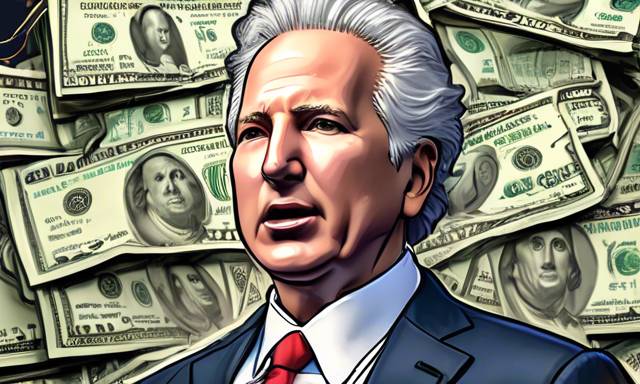Peter Schiff Shares Bold Insights on the U.S. Economy’s Future 🌎💰
In a recent conversation with Kitco News, Peter Schiff, who leads SchiffGold and created Euro Pacific Asset Management, expressed strong views regarding the U.S. economy’s trajectory. He indicated that the Federal Reserve’s upcoming moves could have drastic implications for the U.S. dollar and the broader financial landscape. Schiff contended that reducing interest rates could prove to be an immense mistake, potentially setting the stage for rampant inflation and revealing the Fed’s struggle to manage the economic climate.
Impending Inflation: A Concern for Economic Stability ⚠️
Schiff believes that if the Federal Reserve opts to reduce interest rates, inflation will become uncontrollable, significantly undermining its credibility. He speculated that this could precipitate the eventual downfall of the U.S. dollar. Emphasizing his concerns, Schiff claimed that the era of the dollar being the dominant global reserve currency is nearing its end. He argues that the process of de-dollarization is already in motion and expects its acceleration in the immediate future. This transition, according to Schiff, could instigate profound financial upheaval, striking particularly hard at the U.S. economy.
The Role of Gold as a Safe Haven 🏅
Amid these concerns, Schiff asserted that gold is poised to emerge as the quintessential safe haven asset during turbulent economic times. He projected that the price of gold could climb to as much as $10,000 per ounce in the forthcoming years. Schiff elaborated that as central banks distance themselves from the U.S. dollar, gold is set to reclaim its position as the primary global reserve asset. He maintains that gold has consistently served as the ultimate store of value, and its resurgence will signify the growing instability of fiat currencies worldwide.
Labor Market: A Deteriorating Picture 📉
Shifting his focus to the labor market, Schiff pointed out that recent adjustments to economic data reveal a more disturbing reality about the U.S. economy than what has been previously reported. He cited downward revisions from the Bureau of Labor Statistics, arguing that the number of new jobs created over the last year has been overstated. According to Schiff, many of the newly created jobs are part-time positions filled by individuals grappling with escalating inflation. He further contended that the current labor market is artificially sustained by substandard job opportunities, a direct effect of inflation diminishing real wages.
Government Economic Data Under Scrutiny 🔍
In addition, Schiff expressed his frustrations with the U.S. government’s management of economic statistics, alleging that the true state of the economy is being obscured. He pointed out that labor market and inflation data are frequently revised downwards after their initial announcements, casting doubt on their reliability. Schiff views this trend as indicative of a much weaker labor market and higher inflation rates than the government is willing to acknowledge. This reality, he claims, raises questions about the strength of the economy being presented to the public.
Trade and Budget Deficits: A Growing Concern 📊
Another pressing issue raised by Schiff is the escalation of the U.S. trade and budget deficits. He explained that the U.S. is currently facing unprecedented trade deficits, a situation he believes reflects a feeble economy. Schiff noted that a robust economy typically produces more domestic goods, thus reducing the need for imports. However, he argued that the U.S. increasingly relies on imports, further widening trade deficits, a trend he expects to persist and worsen the nation’s financial challenges.
Federal Reserve’s Policy Decisions: A Warning 🚨
When questioned about the future trajectory of the Federal Reserve, Schiff cautioned against the pitfalls of relying on flawed data, which could result in misguided decisions. He stated that the Fed often uses inaccurate data to support its policies, leading to ineffective monetary strategies. In his view, the Fed’s reliance on government-reported inflation metrics, which he deems unreliable, has blinded policymakers to the genuine scale of the economic crisis.
Gold Price and Government Manipulation Theories 💰🔒
Addressing potential government actions, Schiff posited that the U.S. may be deliberately suppressing gold prices to conceal the dollar’s vulnerabilities. While he acknowledged theories regarding government manipulation of gold prices, he highlighted that gold has seen a significant increase in value over the last twenty years, notwithstanding any suppression efforts. Schiff asserted that the long-term upward trend of gold illustrates a diminishing confidence in fiat currencies.
Economic Outlook: Future Challenges Ahead 🔮
Ultimately, Schiff believes that an economic environment characterized by renewed quantitative easing (QE) and further interest rate reductions is on the horizon. He warned that such measures would likely exacerbate inflation, leading to elevated long-term interest rates, complicating the Fed’s ability to steer the economy effectively. According to Schiff, the Fed may be compelled to intervene in market conditions by acquiring additional bonds, a decision he believes would further destabilize the dollar.
Hot Take: Navigating Economic Uncertainty 🌪️
As you consider the forecasts and insights shared by Schiff, it’s crucial to stay informed about economic developments. The landscape is fraught with challenges, and understanding the shifting dynamics can better equip you to navigate potential future volatility. The importance of remaining aware of these trends cannot be overstated as the financial world continues to evolve.





 By
By
 By
By
 By
By
 By
By
 By
By